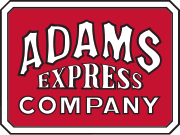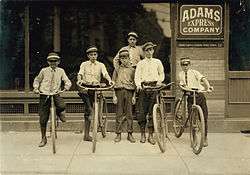Adams Express Company
 | |
| Public | |
| Traded as | NYSE: ADX |
| Industry | Investment |
| Founded | 1854 |
| Founder | Alvin Adams |
| Headquarters | Baltimore, Maryland, U. S. |
Key people |
Mark E. Stoeckle (CEO) James P. Haynie (Executive Vice President) |
| Website | www.adamsfunds.com |
Adams Diversified Equity Fund, formerly Adams Express Company, is a publicly traded diversified equity fund. It was founded in 1854 and traces its roots to 19th-century freight and cargo transport business. The Adams Express Building was constructed in 1911 and Adams Express is one of the oldest companies listed on the New York Stock Exchange (NYSE: ADX). It is one of only five companies that continues to operate as a closed-end fund since 1929. The Company has paid dividends continuously since 1935.
Adams Funds uses a conservative investment philosophy and its portfolio is managed with the expectation that it will generate solid returns with lower-than-market risk for long-term investors. Investments are made with an eye toward protecting investors’ original investments and generating dividends and capital gains that can be used as a source of income or reinvested to increase investor holdings in the Fund.
History
In 1839, Alvin Adams, a produce merchant ruined by the Panic of 1837, began carrying letters, small packages and valuables for patrons between Boston and Worcester, Massachusetts. He had at first a partner named Burke, who soon withdrew, and as Adams & Company, Adams rapidly extended his territory to New York City, Philadelphia and other eastern cities. By 1847, he had penetrated deeply into the South, and by 1850 he was shipping by rail and stagecoach to St. Louis.
Adams Express was used by abolitionist groups in the 1840s to delivery anti-slavery newspapers from northern publishers to southern states; in 1849, a Richmond, Virginia slave named Henry "Box" Brown shipped himself north to Philadelphia and freedom via Adams Express.[1] In 1855, the company was reorganized as the Adams Express Company.
Meanwhile, a subsidiary concern, Adams & Company of California, had been organized in 1850 and spread its service all over the Pacific Coast under the management of Isaiah C. Woods,. Not being under Adams' personal management, Woods badly handled it, and it failed on February 23, 1855.

The South was almost entirely covered by the Adams Express service in 1861, when the American Civil War necessitated the splitting off of another company under Henry B. Plant, which, for political reasons, was given the name of Southern Express. There was a mysterious kinship between the two ever afterward, having joint offices at common points. Southern stock was never quoted in the market, and it was even charged by some Adams stockholders that Southern was secretly owned by Adams. The current official history of Adams, written in 2004, acknowledges that Southern was its subsidiary.[2]
The parent company held a strong position from New England and the mid-Atlantic coast to the far Western plains. Its stock holdings were enormous. In 1910, it was the second largest stockholder in the Pennsylvania Railroad and the third largest in the New York, New Haven & Hartford Railroad, besides owning large blocks of American Express, Norfolk & Western Railroad and other shares.
The company's antebellum employment of Allan Pinkerton to solve its robbery problems was a large factor in building up the noted Pinkerton National Detective Agency. Along with the other expresses, its shipping interests were merged by the government into the American Railway Express Company, which later became the Railway Express Agency.
Adams Express continued its corporate existence as a wealthy investment trust. It has been a closed-end fund (NYSE: A.D.X.) since 1929 and is located in Baltimore, Maryland. As of 2015, it has paid a dividend every year for 80 years (since 1935).[3] Effective April 1, 2015, the company changed its name to Adams Diversified Equity Fund in recognition of the fact that its express activities had long ended; it continues to operate as a closed-end fund traded on the New York Stock Exchange under its previous symbol.
Cultural references
Adams Express is mentioned as former slave Jourden Anderson's preferred form of payment in Letter from a Freedman to His Old Master[4]
See also
- Kate Warne
- William F. Harnden
- Adams Express during the Civil War
- Civil War mail with Adams' postmark
- Petroleum & Resources Corporation
Further reading
- Dictionary of American History by James Truslow Adams, New York: Charles Scribner's Sons, 1940
References
- ↑ Hollis Robbins, "Fugutive Mail: The Deliverance of Henry Box Brown." American Studies, 50:1/2 (Spring/Summer 2009): 5-30
- ↑ Adams Express History
- ↑ About Archived 2007-01-25 at the Wayback Machine.
- ↑ Freedman's Book, pg 265
External links
- Adams Funds
- Digitized images of Adams Express Company Journal, 1855-1863 housed at the University of Kentucky Libraries Special Collections Research Center